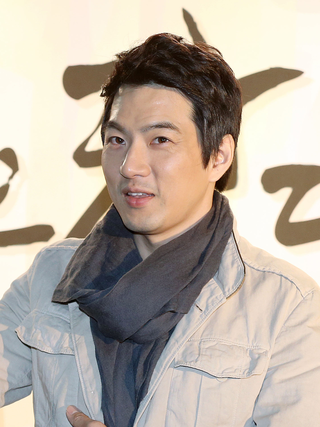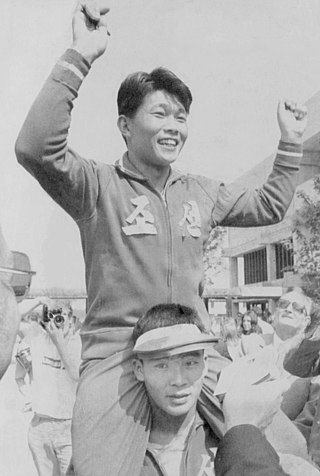Related Research Articles

North Korea, officially the Democratic People's Republic of Korea (DPRK), is a country in East Asia. It constitutes the northern half of the Korean Peninsula and borders China and Russia to the north at the Yalu (Amnok) and Tumen rivers, and South Korea to the south at the Korean Demilitarized Zone. North Korea's border with South Korea is a disputed border as both countries claim the entirety of the Korean Peninsula. The country's western border is formed by the Yellow Sea, while its eastern border is defined by the Sea of Japan. North Korea, like its southern counterpart, claims to be the legitimate government of the entire peninsula and adjacent islands. Pyongyang is the capital and largest city.

Kim Jong Il was a North Korean politician who was the second supreme leader of North Korea from 1994 to 2011. He led North Korea from the 1994 death of his father Kim Il Sung, the first Supreme Leader, until his own death in 2011, when he was succeeded by his son, Kim Jong Un.

Juche, officially the Juche idea, is the state ideology of North Korea and the official ideology of the Workers' Party of Korea. North Korean sources attribute its conceptualization to Kim Il Sung, the country's founder and first leader. Juche was originally regarded as a variant of Marxism–Leninism until Kim Jong Il, Kim Il Sung's son and successor, declared it a distinct ideology in the 1970s. Kim Jong Il further developed Juche in the 1980s and 1990s by making ideological breaks from Marxism–Leninism and increasing the importance of his father's ideas.

South Korea, as Korea, competed at the 1984 Summer Olympics in Los Angeles, United States. The nation returned to the Summer Games after participating in the American-led boycott of the 1980 Summer Olympics. 175 competitors, 116 men and 59 women, took part in 97 events in 19 sports. As the country hosted the next Olympics in Seoul, a traditional Korean segment was performed at the closing ceremony.

South Korea was the host nation and competed as Korea at the 1988 Summer Olympics in Seoul. 401 competitors, 269 men and 132 women, took part in 218 events in 27 sports.
Kim Il is a North Korean freestyle wrestler. He won two Olympic gold medals at the 1992 and 1996 Summer Olympics in the light flyweight (–48 kg) category. He won silver at the 1991 World Championships. In 2006, he was inducted into the Federation Internationale de Luttes Associees Hall of Fame.

Kim Hyon-hui, also known as Ok Hwa, is a former North Korean agent, responsible for the Korean Air Flight 858 bombing in 1987, which killed 115 people. She was arrested in Bahrain following the bombing and extradited to South Korea. There she was sentenced to death but later pardoned.

Song Il-kook is a South Korean actor. He is best known for his role in the 2006 hit drama series Jumong as the titular character.

Kim Jong Un is a North Korean politician who has been Supreme Leader of North Korea since 2011 and the leader of the Workers' Party of Korea (WPK) since 2012. He is the third son of Kim Jong Il, who was North Korea's second supreme leader from 1994 to 2011, and Ko Yong-hui. He is a grandson of Kim Il Sung, who was the founder and first supreme leader of North Korea from its establishment in 1948 until his death in 1994. Kim Jong Un is the first leader of North Korea to have been born in the country after its establishment.
Kim Jong-il, sometimes transliterated Kim Yong-il, is a South Korean retired long jumper, best known for winning two gold medals at the Asian Games. He also competed in the Olympics twice, and was the first Korean athlete to have made a final round at the Olympics. His personal best jump was 8.00 metres, achieved in August 1988 in Seoul. After retiring as an active athlete, he turned to a career in coaching and academics.

South Korea, as Korea, competed at the 1956 Summer Olympics in Melbourne, Australia. 35 competitors, all men, took part in 23 events in 7 sports.
Kim Il-soon is a retired female tennis player from South Korea, who twice represented her native country at the Summer Olympics: in 1988 and 1992.

The Workers' Party of Korea (WPK) is the founding and sole ruling party of the Democratic People's Republic of Korea, commonly known as North Korea. Founded in 1949 from the merger of the Workers' Party of North Korea and the Workers' Party of South Korea, the WPK is the oldest active party in Korea. It also controls the Korean People's Army, North Korea's armed forces. The WPK is the largest party represented in the Supreme People's Assembly and coexists with two other legal parties making up the Democratic Front for the Reunification of Korea. However, these minor parties are completely subservient to the WPK and must accept the WPK's "leading role" as a condition of their existence. The WPK is banned in South Korea under the National Security Act and is sanctioned by the United Nations, the European Union, Australia, and the United States.

Kim Il Sung was a Korean politician and the founder of North Korea, which he ruled from the country's establishment in 1948 until his death in 1994 after which he was declared eternal president. He held the posts of Premier from 1948 to 1972 and President from 1972 to 1994. He was the leader of the Workers' Party of Korea (WPK) from 1949 to 1994. Coming to power after the end of Japanese rule in 1945, he authorized the invasion of South Korea in 1950, triggering an intervention in defense of South Korea by the United Nations led by the United States. Following the military stalemate in the Korean War, a ceasefire was signed on 27 July 1953. He was the third-longest serving non-royal head of state/government in the 20th century, in office for more than 45 years.

Ri Ho-jun was a North Korean sports shooter and Olympic Champion. He won a gold medal in the 50 metre rifle prone event at the 1972 Summer Olympics in Munich, the country's first ever Olympic gold medal. In August 1972 he was awarded the title of Merited Master of Sport of the USSR. He also competed at the 1976 Summer Olympics and the 1980 Summer Olympics.

Kim Yo-jong is a North Korean politician and diplomat serving as the Deputy Department Director of the Publicity and Information Department of the Workers' Party of Korea, or WPK. She also served as an alternate member of the Politburo of the Workers' Party of Korea from 2017 to 2019, and again from 2020 to 2021. Since September 2021, she has also served as a member of State Affairs Commission of North Korea, the only woman on the panel.

The Kim family, also known as the Kim dynasty or the Mount Paektu bloodline in the ideological discourse of the Workers' Party of Korea (WPK), is a three-generation lineage of North Korean leadership, descending from the country's founder and first leader, Kim Il Sung. The patriarch came to rule the north in 1948, after the end of Japanese rule split the region in 1945. He began the Korean War in 1950, in a failed attempt to reunify the Korean Peninsula. In the 1980s, Kim Il Sung developed a cult of personality closely tied to the North Korean state philosophy of Juche. Following his death in 1994, Kim Il Sung's role as supreme leader was passed on to his son Kim Jong Il, and then to his grandson Kim Jong Un. All three men have served as leaders of the WPK and have exercised absolute control over North Korea since the state's establishment in 1948.
Events from the year 1970 in South Korea.
Kim Yeong-il is a South Korean former basketball player. He competed in the men's tournament at the 1964 Summer Olympics and the 1968 Summer Olympics.
Kim Il-nam is a North Korean former footballer. He competed in the men's tournament at the 1976 Summer Olympics.
References
- ↑ "Kim Il Olympic Results". sports-reference.com. Archived from the original on 17 April 2020. Retrieved 15 September 2012.